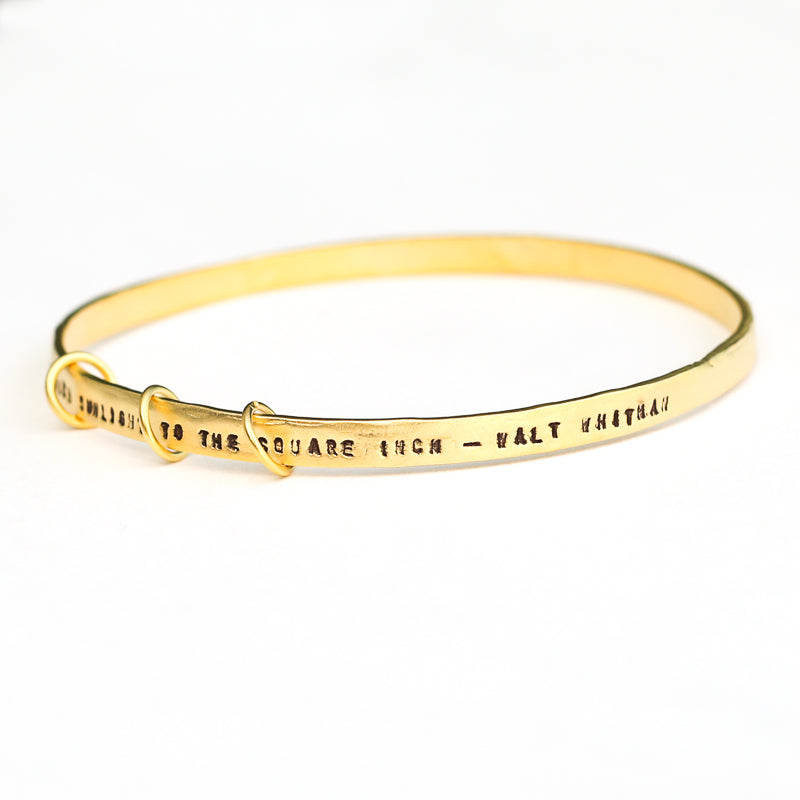Product Details
"Some people are so much sunlight to the square inch.”—Walt Whitman
Whitman's words are hand-cast on a 14K gold vermeil bangle ( 2-1/2" diameter, 1/8" width). There are 3 small 14K wire gold loops on the bracelet.
The designer handcrafts her jewelry collection in a solar-powered studio in Southern California. Each design is sculpted out of clay, and the clay model is then cast in reclaimed metals using the ancient art of lost wax casting. Handmade in the USA.
Whitman’s quote is found in With Walt Whitman in Camden (March 28–July 14, 1888), by Horace Traubel, published in 1906.
The backstory of Horace Traubel is fascinating. According to whitmanarchive.org, Trauble is "best known as the author of a nine-volume biography of Whitman's final four years, Walt Whitman in Camden. He visited the poet virtually daily from the mid-1880s until Whitman's death in 1892, and he began taking copious notes of their conversations in March of 1888. Every night he transcribed his notes and published three large volumes of them (1906, 1908, 1914) before his death, leaving behind manuscripts for six more. His original goal had been to bring out one volume a year until all were in print, but the final two volumes did not appear until 1996, over a century after they were written.
Traubel described himself as Whitman's "spirit child," and for the twenty-seven years he lived on after Whitman's death, he served the poet as a dutiful son: he became the most active of Whitman's three literary executors...; he founded, edited, and published The Conservator, a journal dedicated to keeping Whitman's works alive; he published his own Whitman-inspired poetry and prose in three large volumes; and he carried on a tireless correspondence with Whitman enthusiasts around the country and around the world, weaving together an international fellowship of disciples who worked to assure Whitman's immortality.
Only thirty-three years old at the time of Whitman's death, Traubel had already known the poet for nearly twenty years. Born and reared in Camden, New Jersey, Traubel first met Whitman soon after the half-paralyzed poet decided to live in his brother George's Camden home in 1873. Traubel was then not yet fifteen years old, but he soon became Whitman's companion; they took walks and discussed books endlessly….
As a young adult, Traubel became increasingly involved with radical reformist thought...Traubel traced his liberalism and egalitarianism not only to Whitman but to his hybrid heritage, especially to his father's Jewish background; he said he loved "being a Jew in the face of your prejudice and your insults" (qtd. in Wiksell 119). He always retained his democratic identification with the persecuted and remained a dedicated political and intellectual radical. He kept up a tireless correspondence with leftist and reformist political and artistic figures—excluding Eugene Debs, Emma Goldman, and Upton Sinclair—and he was involved with the Arts and Crafts movement and helped published The Artsman from 1903 to 1907, espousing the belief that radical reforms in art, design, and production were essential to social reform.
Traubel's radicalism did not come without cost. His one stable, salaried position was as a clerk in a Philadelphia bank, a job he began during the last years of Whitman's life and held until 1902, when he published an attack on one of Philadelphia's most powerful businessmen. Under pressure from the bank, Horace resigned and began a life of self-imposed poverty, living on the meager proceeds from his writings and gifts from his supporters.
...During the decades after he quit his bank job, Traubel lived an energetic life. He read most nights until four or five in the morning, then took the morning ferry to Philadelphia so he could work in his garret office on Chestnut Street. While riding the Camden ferry in 1909, he was trampled by a horse and suffered severe rib injuries. By 1914, his health had become a major concern,…[but] Traubel was determined to live through the centenary anniversary of Whitman's birth, and on 31 May he attended the New York celebration, where he was given a standing ovation by two hundred Whitmanites (including Helen Keller) in attendance.
Traubel attended one last centenary event—the August dedication of a huge granite cliff at the Bon Echo estate in Canada, to be named "Old Walt" and inscribed with Whitman's words in giant letters. On 28 August Traubel, while sitting in a tower room where he could look out on Old Walt, shouted that Whitman had just appeared above the granite cliff "in a golden glory." "He reassured me, beckoned to me, and spoke to me. I heard his voice but did not understand all he said, only 'Come on'" (qtd. in Denison 196). Traubel died at Bon Echo on 3 September and was buried in Harleigh Cemetery in Camden, close to Whitman's tomb.”



